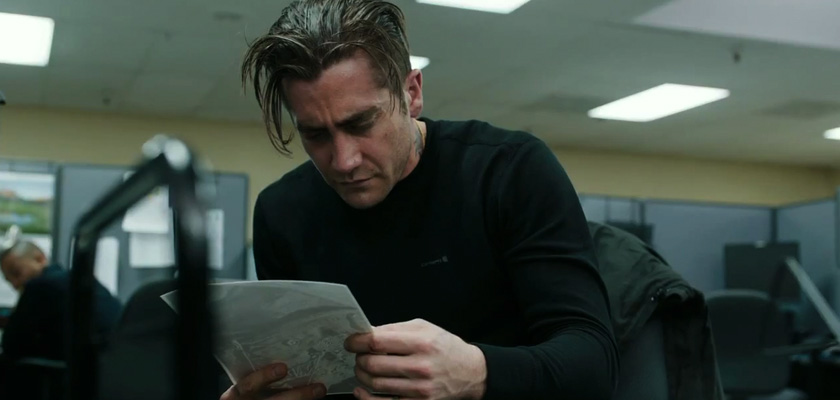In the over-reactionary times in which we find ourselves, few films demand our attention like Prisoners, which released widely last Friday. It’s a tightly-woven narrative that critiques American religiosity, our rush to condemn violators, and our insatiable desire for swift and often violent justice.
The Dover family, father Keller (Hugh Jackman), wife Grace (Maria Bello), son Ralph (Dylan Minnette) and daugther Anna (Erin Gerasimovich) celebrate Thanksgiving with the Birch family, husband and wife Franklin (Terrence Howard) and Nancy (Viola Davis) and daughters, Eliza (Zoe Borde) and Joy (Kyla Drew Simmons). When Anna and Joy go outside to play, they never return. Ralph mentions that he saw them playing near a parked RV earlier in the day. The authorities, lead by Detective Loki (Jake Gyllenhaal), find the RV parked near a gas station. When they approach to investigate, the driver, Alex Jones (Paul Dano) tries to flee. They arrest him but find so sign of the girls in the RV.

Detective Loki questions Alex but has to let him go. Combined with a lack of incriminating evidence, Alex also has the IQ of a 10-year-old. As the investigation stretches over several days, the Dover and Birch families become increasingly desperate. Keller takes matters into his own hands and kidnaps and tortures Alex to get information on where Anna and Joy might be. It’s clear he’s holding out vital information, even though he’s too mentally unstable to convey it. Detective Loki goes about his search and begins to draw connections between Anna and Joy’s disappearance and a string of child abductions stretching back a couple of decades. The film takes several shocking turns before reaching its grisly conclusion.

Written by Aaron Guzikowski, Prisoners is a tightly-woven narrative, but the individual threads themselves might not be so strong. It’s clear that Guzikowski knew where he was going with this from the start, but some of the narrative choices along the way feel problematic. The central kidnapping being a part of a larger series of abductions draws in another character that, while essential to the way Guzikowski develops the plot, feels more like a shock value distraction than a completely necessary character. The villains’ motivation for the kidnapping is equally questionable. They cite a “war on God” in which these kidnappings cause people to lose their faith. It feels too hokey, but it simultaneously fits with the film’s central religious theme(s).
From the start, Prisoners is bathed in religious imagery and iconography. The first bit of dialogue is the Lord’s Prayer. Crosses dominate the Dover family’s surroundings, from jewelry around their necks to decorations on the walls of their house. Apparently, Keller was an alcoholic who is now clean. Yet when crisis strikes, he can’t find comfort or guidance in his faith and turns to his own torturous devices instead. He clearly glosses over passages about loving thine enemy. There’s a brilliant scene later in the film in Alex’s “cell” where Keller tries to pray the Lord’s Prayer again but can’t bring himself to recite the “as we forgive those” part, which causes him to reflect on his previous request for God to “forgive us our trespasses.”

As such, Prisoners is simultaneously a commentary on guilt, evil, and responsibility. The film presents a spectrum of (in)action, in which we all have a place: from the innocence of the children to Detective Loki’s search to Grace mentally checking out to Franklin and Nancy facilitating Keller’s abuse of Alex to Keller’s abuse itself and finally to those responsible for kidnapping and torturing innocent children. Prisoners explicitly forces us to consider where we would fall in the spectrum, and it’s a question that we should ask ourselves more frequently vis-a-vis the crises that we encounter everyday, either indirectly through the news media or in our own lived experiences.
I do question the stakes laid out in the film. Alex pays far too dear a price given his stature in life and involvement in the events surrounding the Dover/Birch families. As you can probably imagine, if you’ve seen the trailer, Keller goes to a dark place when he kidnaps Alex. It’s not too much of a spoiler to say that this place is both emotional and spiritual and, in the end, physical. But there’s an ambiguous ending that suggests he might get off too lightly for his reactions to his daughter’s disappearance. I’m not suggesting that the Dover/Birch families don’t suffer or lose something through their ordeal, but I think it’s fair to question the depth of those losses given the aggressive ways in which they responded.
Prisoners benefits from some fine performances all around, but particularly from Jackman, Dano, and Gyllenhall, even if the latter’s character was somewhat under-developed. I’m still debating just how “good” I think the film is, but there’s no question that it’s worth the price of admission. It’s one of the more thrilling theatrical experiences I’ve had in a long while.
Prisoners (146 mins.) is rated R for disturbing violent content including torture and language throughout and is in theaters everywhere. Also, there are snakes.
